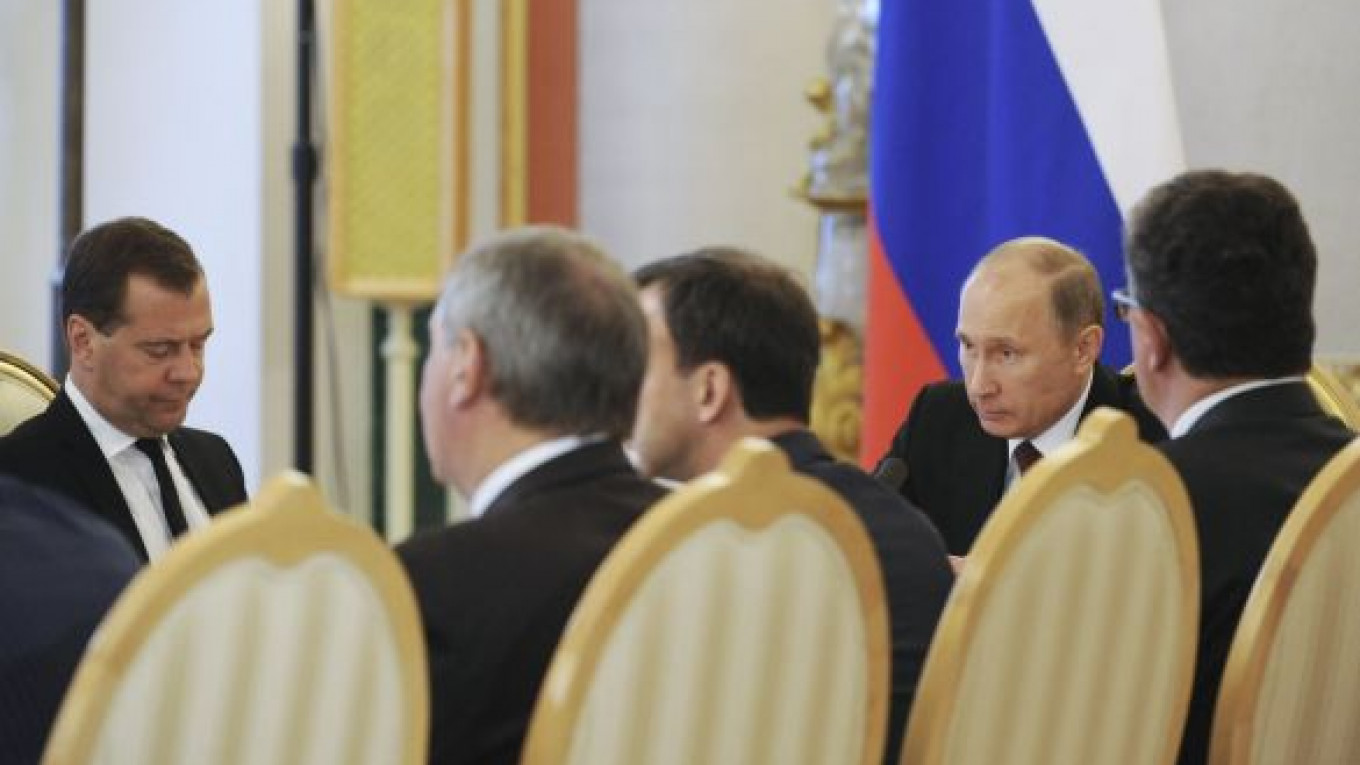In the coming years, the government will get less revenue than was expected before, and the budget policy for 2014-2016 has to be planned accordingly, President Vladimir Putin said on Thursday while presenting the budget policy to senior government officials and lawmakers.
Putin also said that while revenues from natural resources are decreasing, financing coming from other industries is so far limited.
"The share of federal government revenues coming from oil and gas sales rose from 30 percent in 2004 to 46 percent in 2013," Putin said.
In 2007, with oil prices at $69 per barrel, the budget was in surplus, while last year, when oil prices were as high as $110 per barrel, it ran into a deficit, the president added.
"The means to increase state spending have been exhausted, so this implies we must look for reserves, funds should be allocated for priority areas and projects that would create the basis for economic growth and implement the tasks that were spelled out in presidential decrees issued in May 2012," Putin said.
Dmitry Kamnev, deputy head of the public finance department at the Higher School of Economics, said that this way, Putin once again gave a reminder that he is closely watching how well his decrees are being enforced.
"This is an obstacle, without overcoming it Putin cannot go on to new tasks," Kamnev said. "The decrees cover many social aspects that are crucial for the people, so the President strives to solve both social and economic problems."
Putin also asked the Cabinet to work out Russia's budget strategy up to 2030 within three months and, if necessary, revise the social and economic development outlook.
Putin urged the Cabinet to allocate, starting from this year, money accumulated in the Pension Fund and the National Wealth Fund for infrastructure projects that would create maximum economic growth while incurring minimal risk for the government.
He also said public-private partnerships should be used whenever possible for infrastructure projects, and necessary legislative changes should be made to promote such partnerships.
"This could be a means for regions to attract additional financing because these infrastructure projects are meant to generate revenue and not just serve as a black hole for government spending," Kamnev said.
The financial burden on regional and local budgets has grown, the president said.
The results for last year showed that in almost a third of Russia's regions the ratio of debt to revenue exceeded 50 percent, while regional government investments dropped, Putin said.
He also said regional government expenditures should be covered by their own revenues, as opposed to federal subsidies.
One measure that was supported by business representatives was an effort to improve the tax system.
"Tax management and accounting should be more closely intertwined," Putin said.
He also called for introducing tools for fighting tax evasion, including the use of offshore jurisdictions. Putin added that legislation needed to be modified to increase the taxes for those who buy elite property.
"Initiatives that increase the competitiveness of our tax system can only be welcomed," said Alexander Galushka, vice chairman of the Delovaya Rossia business association. "We have to get rid of double accounting. Also, we need a tax system that would stimulate economic development. It should allow businessmen to make more profits when investing at home rather than when buying property abroad or channelling their funds to offshore jurisdictions."
Contact the author at a.panin@imedia.ru
Related articles:
A Message from The Moscow Times:
Dear readers,
We are facing unprecedented challenges. Russia's Prosecutor General's Office has designated The Moscow Times as an "undesirable" organization, criminalizing our work and putting our staff at risk of prosecution. This follows our earlier unjust labeling as a "foreign agent."
These actions are direct attempts to silence independent journalism in Russia. The authorities claim our work "discredits the decisions of the Russian leadership." We see things differently: we strive to provide accurate, unbiased reporting on Russia.
We, the journalists of The Moscow Times, refuse to be silenced. But to continue our work, we need your help.
Your support, no matter how small, makes a world of difference. If you can, please support us monthly starting from just $2. It's quick to set up, and every contribution makes a significant impact.
By supporting The Moscow Times, you're defending open, independent journalism in the face of repression. Thank you for standing with us.
Remind me later.






